Plan Voyage Profile

Last Updated: By TRUiC Team
Plan Voyage is an event technology startup that is streamlining every step of the event planning process through digitization.
Interview With Keeley Edens and Jessica Gaughan
Describe your product or service:
“Our main goal at Plan Voyage is to automate the seemingly manual event industry. We utilize the world of technology to streamline the process from proposal to execution — all while leaving trusted local vendors as the experts in their field working directly with the client.”
Describe your company values and mission:
“We’re truly passionate about transparency, education, and mutually beneficial relationships within the industry. We’ve touched on all of these by featuring universal pricing, consolidated invoices and contracts for ease of use, plus helpful (and fun) tips along the way! It really was designed for both the first-time planners and the seasoned professionals.”
How are you funded? I.e. type of funding, number of funding rounds, total funding amount.
“We’re actually self-funded up to this point. We started a crowdfunding campaign a few weeks ago, so we’re hopeful about that!”
How big is your team? Tell us a little about them (I.e. co-founders, freelancers, etc.)
“Currently, it’s just Jess and I spearheading the product to launch. We’re looking to bring someone with more of a technology-based background to the team, but for right now, it’s just us.”
How did you come up with and validate your startup idea? Tell us the story!
“We both left the events industry after it, unfortunately, came to a screeching halt in the pandemic. We took jobs at different healthcare data firms, and it wasn't until about a year later that we realized the new job "learning curve" wasn't really going away and we lost our passion for our work that we so desperately were chasing. A solo lunch break led Keeley to scroll through LinkedIn looking for inspiration. It was an article about Whitney Wolfe Herd — and her story — that got the wheels SPINNING. She thought to herself, "How do we take what we know ... our knowledge, our experience, our passion ... flip the script, and do it better?". And that was the exact text she sent to Jessica. A few texts back and forth, and we had our idea. We knew we had to run with it.”
How did you come up with your startup's name? Did you have other names you considered?
“You know, we tossed around quite a few. In the first few brainstorming sessions about the business plan, we had already known we wanted to be available in all major US cities ... so, we wildly started with AnywhereAccess and then began playing around with different languages and puns, like "Plan-it" (Planet). The startup secret is that we actually never came to a conclusion. We spitballed name ideas for a few weeks and nothing really stuck. One day, Keeley pulled the trigger after hours of research and filed the LLC and trade name license for Plan Voyage. She didn't tell Jessica until the documents went through and everything was finalized. Talk about a leap of faith!”
Did you always want to start your own business? What made you want to become an entrepreneur?
“Once you meet us, you'll instantly know we were meant for this. We have always been the ones that go off script — the ones that do what it takes to get the job done. We're not [ruled by] followers by any means, and we think that's exactly what it takes to succeed in entrepreneurship. All the things they say about it are true — it takes blood, sweat, tears, and many sleepless nights to make this happen. We're beyond excited for what's to come!”
Feeling inspired? Learn how to launch your company with our guide on how to start a startup.
Did you encounter any roadblocks when launching your startup? If so, what were they and what did you do to solve them?
“Of COURSE we did! I would say the first one was not doing enough research on who we were hiring. We put a LOT of trust in a company we hired for external development. We fell in love with who they were, the way they spoke, their promises ... and we did so much research on who they were, the company, etc. But we trusted that they could take on OUR project. They were great — amazing reviews, with a good portfolio. What we didn't realize was truly how complex our scope was until we got five months or so in. We all know that almost NO company is going to out-right tell you, "hey, I think this is over our head, we can't complete this." Neither did this company. We needed to recognize when the productivity was slowing down and PIVOT. So we did. And our second roadblock was that the new developers we selected to bring our product to the finish line, were about ... I don't know ... 500% more costly than the last? Yep, you guessed it, we ran out of funding. It crushed us. But we did what we normally do and we pivot. We started a Kickstarter account, we reached out to everyone we knew and even people we didn't know and set up investor meetings. Solution still pending.”
Who is your target market? How did you establish the right market for your startup?
“We like to say our target market is anyone with a smartphone — but in all honesty, it's more around the 25-50 age range. Not gender-specific either. We specifically designed this to be easy for anyone to use, regardless of your experience in planning events. Whether you are a dad trying to plan your son's 16th birthday party, a mom planning her daughter's baby shower, you planning your own wedding, or a local professional planning your offices' holiday party.”
What's your marketing strategy?
“We're really going grassroots style — the ‘long game’ if you will. We want this to be a platform and a community of people that everyone knows they have in their back pocket. So, we're not going to be doing mass production marketing or advertising. We'll be hoping for word-of-mouth referrals. One, or both, of us will be boots on the ground going to each event to meet our clients and build those relationships — like we said, we want you to come back to us EVERY time you have something to celebrate.”
How did you acquire your first 100 customers?
“This is still a pending topic, but we have about 25 people that have wanted to use Plan Voyage pre-launch!”
What are the key customer metrics / unit economics / KPIs you pay attention to to monitor the health of your business?
“We know the industry can fluctuate all on a flip of a dime (or one press conference :0), so we won't be measuring our success by sales. If we have $20,000 less in sales our second year than our first, we won't be stressed out. We're going to be paying attention to our client retention rate. If in the first year we have 100 events and all of them are first-time clients, we know we're doing something wrong.”
What's your favorite startup book and podcast?
“It's not the traditional 'entrepreneur' book, but ‘Greenlights’ by Matthew McConaughey really taught us the value in pivoting. That something may appear to be a roadblock, but if you look at it differently, or reposition yourself, that you'll see it's just a redirection. It's your cue to pivot. And in being able to recognize that and RUN WITH IT, you'll always find success.”
Is there a tool, app, or resource that you swear by to help run your startup?
“We've used Canva every single day since we've had the idea. From social media to pitch decks and everything in between.”
What is something that surprised you about entrepreneurship?
“Full disclosure — the small fails. We started out really smoothly. We had no issues filing for any documentation, the name selected was available, we got our website domain, and we thought we hit the jackpot with both the development team and the lawyer we hired. The small fails were not something we were familiar with until recently. And it hit home for us hearing that ‘Entrepreneurship is not for the weak.’ It absolutely is NOT. If you aren't passionate, and we mean, FULLY passionate about your product, your vision, and your partner … it's so easy to give up when you hit the first speed bump.”
How do you achieve work/life balance as a founder?
“This was a tough one as a ‘first-timer.’ We wanted to submerge ourselves in the business the first few months, and we did just that actually! But it was maybe around month six that we realized we were going to burn ourselves out doing that long term. We also were best friends before the business and realized we hadn't hung out as friends since starting it, so we make it a point to do that every so often. It's important to find the ‘fun’ in work, no matter what you're doing, but especially when starting a company you'll (hopefully) be eating, breathing, living for the decades to come.”
What is a strategy you use to stay productive and focused?
“Taking a moment to ‘braindump’ all the things we need to do and want to do, then prioritize. Prioritization is key — knowing how to determine a plan is the best way we stay not only focused but productive!”
Did you have to develop any habits that helped lead you to success? If so, what are they?
“Time Management! Holy moly. Starting a business on the side while keeping a day job, a social life, and a good sleep schedule is actually impossible without it.”
What was your first job and what did it teach you?
“Funny enough both of us started out hosting/serving at local restaurants. It taught us HOSPITALITY. More specifically, how to treat clients, how to work in a team, and mainly patience.”
Recommended:
- Keep up with more startup companies by visiting our list of the top startups to watch.
- Hear startup stories from real founders on the Startup Savants podcast.
- Form your own startup by reading our review of the best online incorporation services.
Tell Us Your Startup Story
Are you a startup founder and want to share your entrepreneurial journey with our readers? Click below to contact us today!
More on Plan Voyage

Insights From the Founders of Event Tech Startup Plan Voyage
We were fortunate enough to hear some valuable insights during our interview with Keeley Edens and Jessica Gaughan of Plan Voyage that will inspire, motivate, and teach aspiring and established entrepreneurs alike.

3 Ways to Support Event Tech Startup Plan Voyage
We asked Keeley Edens and Jessica Gaughan, founder of Plan Voyage, to share the most impactful ways to support their startup, and this is what they had to say.


